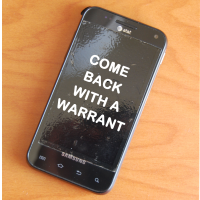Supreme Court, In Unanimous Ruling, Says Police Need Warrant to Search Cell Phones
 (graphic: Steve Straehley, AllGov)
(graphic: Steve Straehley, AllGov)
In the first decision of its kind, the U.S. Supreme Court has rejected law enforcement’s current practice of searching suspects’ cell phones without a warrant.
The unanimous decision was described as a huge victory for Americans’ privacy rights. Orin S. Kerr, a law professor at George Washington University, called it “a bold opinion,” telling The New York Times: “It is the first computer-search case, and it says we are in a new digital age. You can’t apply the old rules anymore.”
Police have relied on pre-Internet age laws to justify searching confiscated cell phones to find information pertinent to criminal investigations. But the court, led by Chief Justice John Roberts, found this practice out of date and unacceptable at a time when Americans carry so much, and varied kinds of information in their phones.
“The fact that technology now allows an individual to carry such information in his hand,” Roberts wrote in the opinion, “does not make the information any less worthy of the protection for which the founders fought.”
Roberts pointed out that even the term “cell phone” is misleading. “Many of these devices are in fact minicomputers that also happen to have the capacity to be used as a telephone. They could just as easily be called cameras, video players, Rolodexes, calendars, tape recorders, libraries, diaries, albums, televisions, maps or newspapers,” he wrote.
The court also rejected government arguments that warrantless searches are necessary to prevent suspects from deleting potentially important data.
The ruling did uphold the power of police to turn off phones, remove batteries or shield them in aluminum foil bags to protect against remote wiping. They can also open them up to ensure the absence of weapons, such as razor blades.
The decision has implications beyond cell phones, according to Adam Liptak of the Times, who reported the ruling could apply to information stored on laptops and tablets, and “its reasoning may apply to searches of homes and businesses and of information held by third parties like phone companies.”
-Noel Brinkerhoff
To Learn More:
Major Ruling Shields Privacy of Cellphones (by Adam Liptak, New York Times)
Riley v. California (Oyez)
Riley v. California (U.S. Supreme Court) (pdf)
Massachusetts Joins New Jersey in Demanding Police Warrants for Cell Phone Tracking (by Noel Brinkerhoff, AllGov)
New Jersey Supreme Court First to Order Warrants for Cell Phone Tracking (by Matt Bewig, AllGov)
- Top Stories
- Unusual News
- Where is the Money Going?
- Controversies
- U.S. and the World
- Appointments and Resignations
- Latest News
- Musk and Trump Fire Members of Congress
- Trump Calls for Violent Street Demonstrations Against Himself
- Trump Changes Name of Republican Party
- The 2024 Election By the Numbers
- Bashar al-Assad—The Fall of a Rabid AntiSemite






Comments